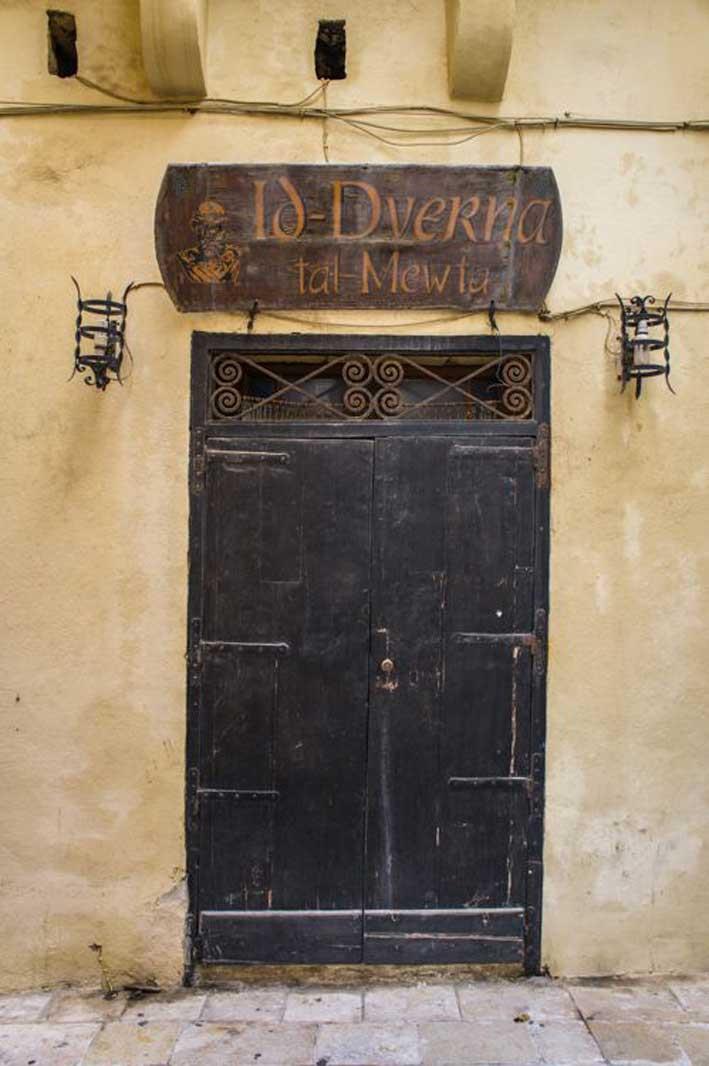The history of wine in Gozo dates back to 500BC, when, as, autumn approached, Roman galleys disembarked at Mġarr ix-Xini harbour. Their load was amphorae filled with wine that had been pressed in the valley. The Romans discovered that wine could replace and preserve water in amphorae.
In Mġarr ix-Xini, winemakers would fill shallow basins with grapes and, once pressed, the juice would flow through holes and channels into a deeper collecting holder, all carved into the rock.
These wine presses, can still be seen implanted in the Gozitan valley of Mġarr ix-Xini.
In the early 1920s, the importance of wine, vinegar and oil in the healing process were still in its heydays in most countries and it was still by and large common wisdom that beer and wine were generally safer to drink than water, due to the possible risks posed by unhygienic sanitation and drainage systems. This, not to mention, the healing properties of wine which resulted in it being widely used in hospitals, homes and other institutions (including the Church) as part of the treatment of the sick.
This importance of wine in the Maltese islands' economy is perhaps best illustrated and underlined by the statistical figures found in Blue Books over the years. One particular year, 1921 reveals the amount of wine imports to these islands.
Wine importation accounted for the fourth largest import in the category of food, drinks and tobacco, totalling Sterling 133,570 out of a total import bill of Sterling 2,066,571.
Malta, in that year also re-exported wine (other than domestic wine) to the tune of Sterling 7,733.
Wine also accounted for total customs revenue of Sterling 39,000 out of a total revenue of Sterling 339,474.
Where it comes to country of origin, Spain accounted for the main exporter of wine to Malta with a volume of 1,204,041 gallons of wine and a corresponding value Sterling 124,339. The amount of this import dedicated to home consumption was 1,232,428 gallons.
Wine was mainly exported in casks of up to 15 gallons. Wine was also imported in casks of over 15 gallons, wines in bottles (sparkling), wines in bottles up to 15 gallons and wines in bottles (still) over 15 gallons. The consumption of wine in the early 1920s was no less popular in the sister island of Gozo in this period as evidenced by a recently unearthed register of receipts from this period.
According to the Gozitan poet and historian, Charles Bezzina, during the 1920s, St Francis Square (Pjazza San Franġisk, Rabat, Gozo) had numerous wine shops and one particular shop was owned by the Aquilina family which was situated at the side of the Church.

The daily sales register of one particular wine vendor (name unknown) reveals the amount paid to the merchant for the wine which was made by the barrel or bottle. Sometimes the sale was done to offset an outstanding cash balance owed to the purchaser.
This Gozitan wine daily sales register not only gleans on the type of wine purchased by the different clients in 1920s Gozo but also gives a glimpse of early double-entry book-keeping as each customer was assigned a ledger folio number in the left-hand side column revealing that apart from the daily sales register there was another book (register) that held accounts for each customer. Modern book-keeping is generally thought to have been invented during the Italian Renaissance by a Franciscan friar named Luca Pacioli in 1494.
The Gozitan merchant dealt exclusively in Spanish wine which was the main exporter of wine to the Maltese islands. He also sold some olive oil.
From a sociological point of view, this receipts register can be used as a significant representative random sample of Gozitan society at the time. This results from the different Gozitan individuals (from different social classes) and organisations of the time with their respective family nicknames, quantities purchased and prices paid are shown in detail on each page.
Some of the Gozitan individuals (with nicknames/family names) and institutions purchasing wine from the merchant were:
21 November 1921
- Anġela Said
- Ċensu ta' Ġolla
- Dr Tomaso Cauchi
- Ġiorgio Schembri
22 November 1921
- Giuseppe Abela
- Paolo Abela
- Giuseppe Grech
- Giuseppe Cini
- Giuseppe Mercieca
- Carmelo Xuereb
- Antonio Curmi
- Paolo Scicluna
- Giuseppe Grech
23 November 1921
- Giorgio Frendo
- Luigi Zammit
- Giuseppe tal-Ċarlina
- Giorgio Grech tal-Marcel
- Michel Angelo Bajada
- Paola Scicluna
- Giuseppe Grech
- Francesco Attard
- Galtona Cassar
- Angela Said
- Dr Tomaso Cauchi
- Maria Camilleri
24 November 1921
- Giorgio Said
- Lorenzo Farrugia
- Paolo Abela
- Carmelo Pace
- Giuseppa ta' Ċarella
- Lorenzo Grima
- Carmelo Galea
Some other buyers in 1921 and 1922 were as follow:
- Suori Ta' L-Istilla
- Seminario Vescovili
- Maestro Flores
- Francesco tal-Chicken
- Maestro Gio Batta Pace
- Matasil
- Giuseppe tal Carlina
- Avv. Giuseppe Masini
- Saverio il-Polcal
- Ta' Lihhia
- Don Tommaso Cauchi
- Censu ta' Żolla
- Squadra Sammut
- Francesco Gauci ta' Gerger
- Convento Cappuccini
- Giorgio Debrincat
- Mons. Vescovo
- Minori Conventuali
- Mons. S. Cordina
From the above list, clients hailed from all walks of society but mainly from the upper classes of Gozitan society who could afford to purchase wine in large quantities. The Church institutions and individual clerics also bought wine in bulk.